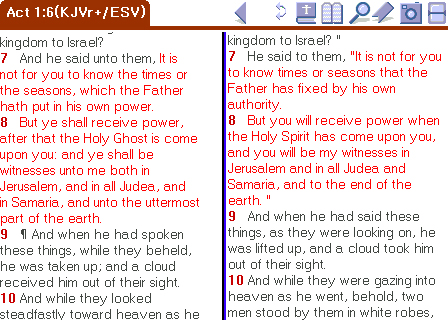 A recent tweet by the Folks at Audio Bible/Faith Comes by Hearing (@audiobible) got me thinking (again):
A recent tweet by the Folks at Audio Bible/Faith Comes by Hearing (@audiobible) got me thinking (again):
If u could carry the Bible around with u in more than 500 languages – like in your pocket – how would u use it? #Hmmmm #GreatCommission
I used to carry 1, then 2, then 15, and at one time over 100 Bibles around with me on my mobile devices (thanks Bible+). At the time, I justified it because I was (a) reading/studying Scripture a ton more than I do now, and (b) I interacted with several people who “heard” the Scriptures best in the translation they most used. Being that I was also at college during this time, it felt like the right way to approach speaking spiritual matters in a clear and consistent manner (1 Cor 14:1-19).
I don’t carry as many Bibles with me these days. In fact, until recently I didn’t carry any versions on my mobile (still no app, but I’ve got a Bible), and the ones on my iPad are the same in each Bible app or website (ESV, KJV, NET, and a few others). I’ve got less a need to carry as many versions of the Word as I do the onus to live as much of the Word so that when asked, I can give the appropriate answer to my faith (1 Peter 3:15-16). That, and the consistency of being in or near connected spaces allows me to search quickly from a series of websites when needed, or just make a note for something to come back later to.
That’s not the case for all folks. Many of the frequent travelers and missionaries I’ve met would jump at the ability to have Bibles and other texts in as many languages as needed, and at a moment’s notice. Their interactions almost require it of them. And when they are able to have something that speaks right to their audiences, it makes living among mixed groups that much easier to manage. When they don’t have that content, or even the ability to get a clear translation, their relationships to people and environments suffer.
But such use speaks to that end of things – where the tweet asked “how would you use it?” Many of use have libraries of Bibles and other content in print on bookshelves (digital and otherwise), but what have we done with it besides making it decorative? Have we taught someone to read, or took the time to use those resources to tutor people who are studying those subjects we’ve collected? Have we engaged the cultures beyond the pages and held the kinds of conversations that would amplify or change our opinions of those cultures, people, and events? Or, is it just a number?
In grade school, many of us learned about the terms kinetic and potential energy. Kinetic energy is identified by its impetus to move – the energy immediately before movement happens. Potential energy, on the other hand, is energy that is stored and is usually static due to its position or configuration. You’ve got that neat Olive Tree, Logos, YouVersion, or Bible.is app with hundreds of Bibles and other materials ready to be used. Are you in the process of transferring that energy into the lives of others, or are you configured simply to display the potential of what can be?